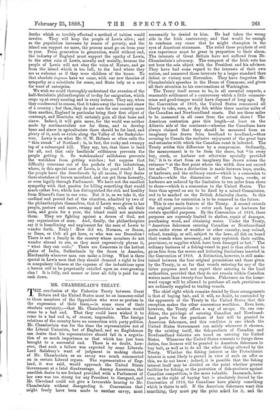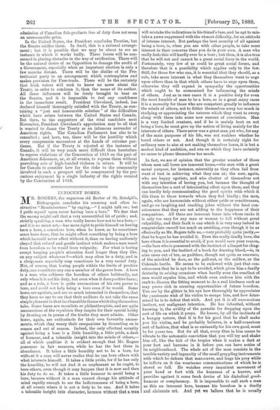MR. CHAMBERLAIN'S TREATY.
THE conclusion of the Fisheries Treaty between Great Britain and the United States must be an immense relief to those members of the Opposition who were so profuse in the expression of their fears,—in some cases of their absolute certainty,—that Mr. Chamberlain's mission would come to a bad end. That they could have wished it to come to a bad end is, of course, impossible. The foreign relations of the country have no connection with party politico. Mr. Chamberlain was for the time the representative not of the Liberal Unionists, but of England, and no Englishman can desire that his representative should fail in a negotia- tion of so much importance as that which has just been brought to a successful end. There is no doubt, how- ever, that such a failure was expected by some Liberals. Lord Salisbury's want of judgment in making choice of Mr. Chamberlain as an envoy was much commented on in certain Liberal organs. The representative of Eng- land, it was said, would approach the United States Government at a fatal disadvantage. Among Americans, the unselfish desire to see Ireland provided with a Parliament of her own was too strong for any President to disregard, and Mr. Cleveland could not give a favourable hearing to Mr. Chamberlain without disregarding it. Concessions that might freely have been made to another envoy, must
necessarily be denied to him. He had taken the wrong side in the Irish controversy, and that would be enough to condemn any cause that he might champion in the eyes of American statesmen. The relief these prophets of evil now experience must be great in proportion to their alarm. The interests of Great Britain have not suffered from Mr. Chamberlain's advocacy. The conquest of the Irish vote has not been the sole object with the President and his advisers. They have had some regard to the interests of their own nation, and measured those interests by a larger standard than defeat or victory next November. They have forgotten Mr. Chamberlain's speeches in the House of Commons, and given all their attention to his conversations at Washington.
The Treaty itself seems to be, in all essential respects, a reasonable settlement of a controversy which a little common- sense and good-temper would have disposed of long ago. By the Convention of 1818, the United States renounced all liberty to take, cure, or dry fish within three marine miles of the Canadian and Newfoundland coasts. But are these miles to be measured in all cases from the actual shore ? The American contention goes this length—at least on the Atlantic side of the continent—whereas the Canadians have always claimed that they should be measured from an imaginary line drawn from headland to headland,—thus securing to Canada the exclusive enjoyment of the great bays and estuaries with which the Canadian coast is indented. The Treaty settles this difference by a compromise. Ordinarily, the measurement is to be from the shore, but "in every bay, creek, or harbour not otherwise specially provided for," it is to start from an imaginary line drawn across the entrance "at the first point where the width does not exceed ten miles." Thus a distinction is made between bays, creeks, or harbours, and the ordinary coast—which is a concession to Canada—while the dimensions of these bays, creeks, or harbours are reduced by the limitation to ten miles from shore to shore—which is a concession to the United States. The lines thus agreed on are to be fixed by a mixed Commission, and to be marked on the British Admiralty charts. In this way all room for contention is to be removed in the future.
This is one main feature of the Treaty. A second extends the original permission to enter such bays or harbours for certain specified purposes. By the Convention of 1818, these purposes are expressly limited to shelter, repair of damages, purchasing wood, and obtaining water. Under the Treaty, "American fishermen entering Canadian or Newfoundland ports under stress of weather or other casualty, may unload, reload, tranship, or sell, subject to the laws, all fish on board their vessels when necessary, and may replenish their outfits, provisions, or supplies which have been damaged or lost." The ordinary business of a fishing-vessel in port is thus allowed to go on free from the severe and irritating limitations inserted in the Convention of 1818. A distinction, however, is still main- tained between the four original permissions and those given by the Treaty, in so far that vessels entering for any of the latter purposes need not report their entering to the local authorities, provided that they do not remain within Canadian waters more than twenty-four hours. Fishermen on the home- ward voyage will be allowed to purchase all such provisions as are ordinarily supplied to trading vessels.
The chief right which remains denied by these arrangements is that of buying bait, and it will, no doubt, be contended by the opponents of the Treaty in the United States that this exception makes the other concessions worthless. Even here, however, the Treaty offers a way of escape. On one con- dition, the privilege of entering Canadian and Newfound- land ports for the purchase of bait will be granted to American fishermen, and this condition is one which the United States Government can satisfy whenever it chooses.
By the existing tariff, the fish-products of Canadian and Newfoundland fisheries are taxed on entering the United States. Whenever the United States consents to forego these duties, free licences will be granted to American fishermen to buy bait, as well as to do all the other things allowed by the Treaty. Whether the fishing interest or the Protectionist interest is most likely to prevail in view of such an offer as this, we do not know ; indeed, it is possible that the fishing interest itself may be divided on the point whether greater facilities for fishing, or the protection of fish-products against
Canadian competition' is the more valuable. Inasmuch, how- ever, as the right of buying bait is absolutely denied by the Convention of 1818, the Canadians have plainly something which is theirs to sell. If the American fishermen want this something, they must pay the price asked for it, and the
admission of Canadian fish-products free of duty does not seem an unreasonable price. In the United States, the President concludes Treaties, but the Senate ratifies them. In itself, this is a rational arrange- ment; but it is possible that we may be about to see an instance in which it works badly. Three forces will be con- cerned in placing obstacles in the way of ratification. There will be the natural desire of an Opposition to damage the credit of a Government, especially when an important election is only a few months distant. There will be the dislike of the Pro- tectionist party to an arrangement which contemplates and makes provision for Free-trade. There will be the certainty that Irish voters will seek to know no more about the Treaty, in order to condemn it, than the name of its author. All these influences will be freely brought to bear on the Senate, and it is impossible to feel any confidence in the immediate result. President Cleveland, indeed, has declared himself thoroughly satisfied with the Treaty, as con- taining a "just and honourable solution's of the difficulties which have arisen between the United States and Canada. But then, to the supporters of the rival candidate next November, President Cleveland's approbation may be all that is wanted to damn the Treaty as an infamous surrender of American rights. The Canadian Parliament has also to be consulted ; and here, too, there will be the hostility which every compromise encounters at the hands of extreme par- tisans. But if the Treaty is rejected at the instance of Canada, it will be very much more difficult than heretofore to repress violations of the Convention of 1818 on the part of American fishermen, or, at all events, to repress them without provoking acts of high-handed violence in return. It will be for Canada to consider how far the risks to the community involved in such a prospect will be compensated by the pre- carious enjoyment by a single industry of the rights secured by the Convention of 1818.







































 Previous page
Previous page